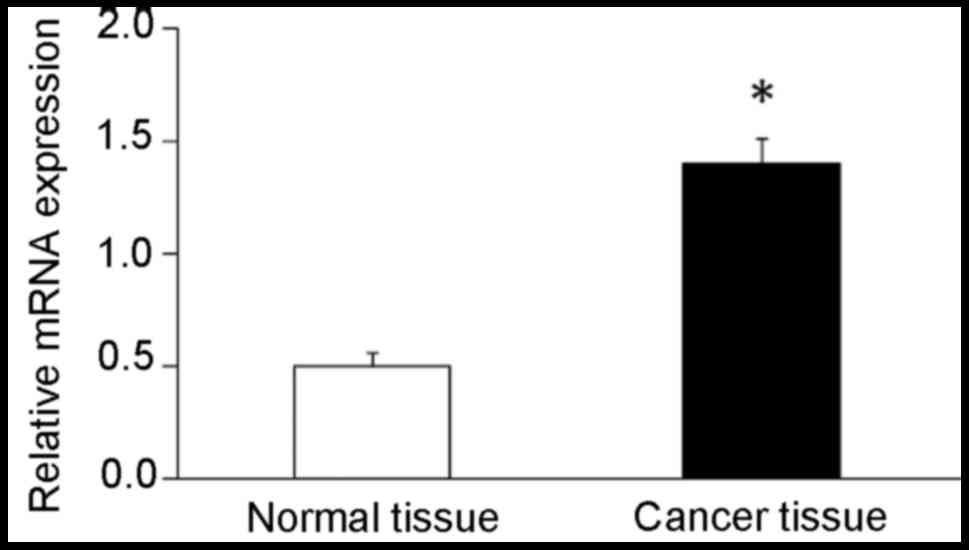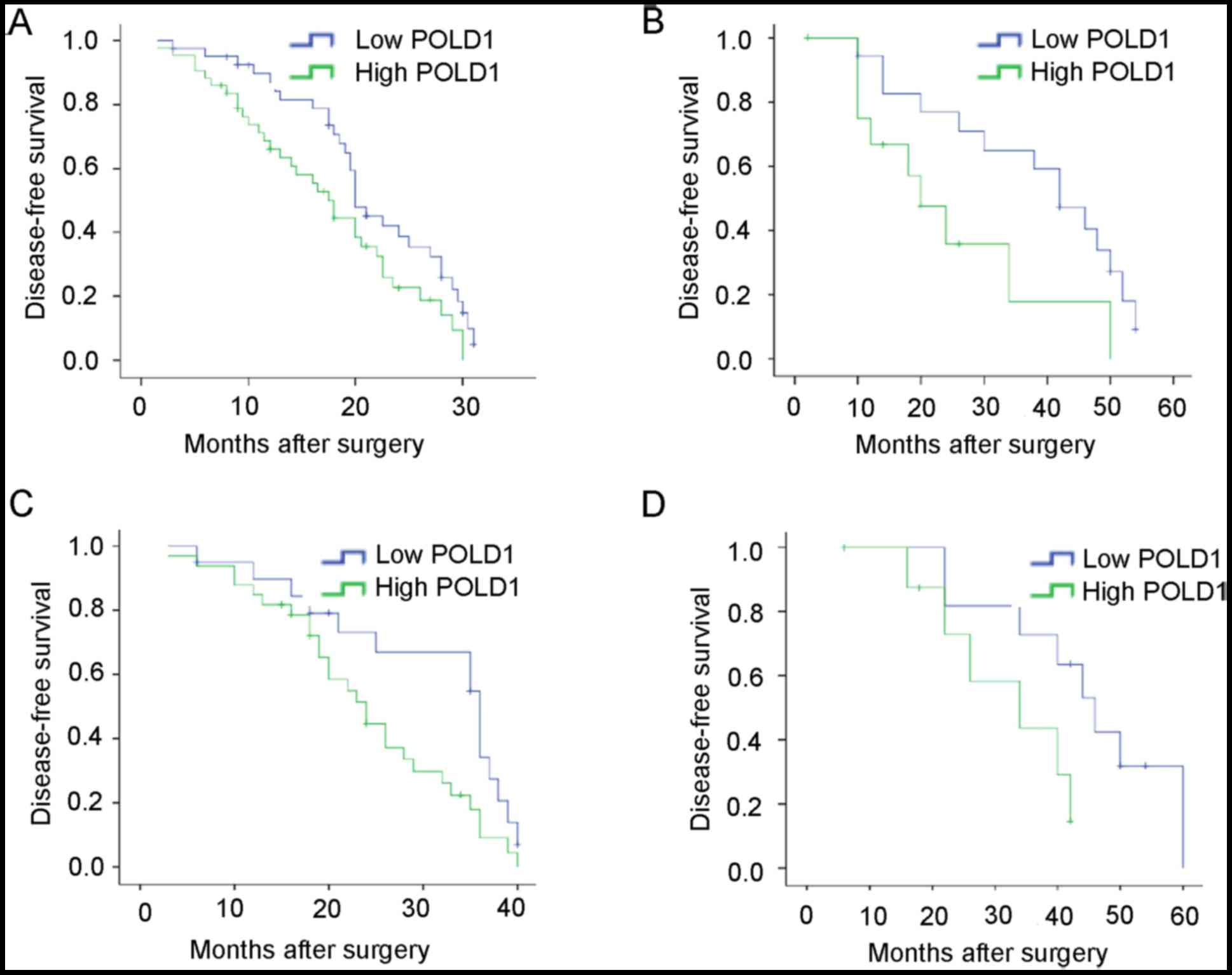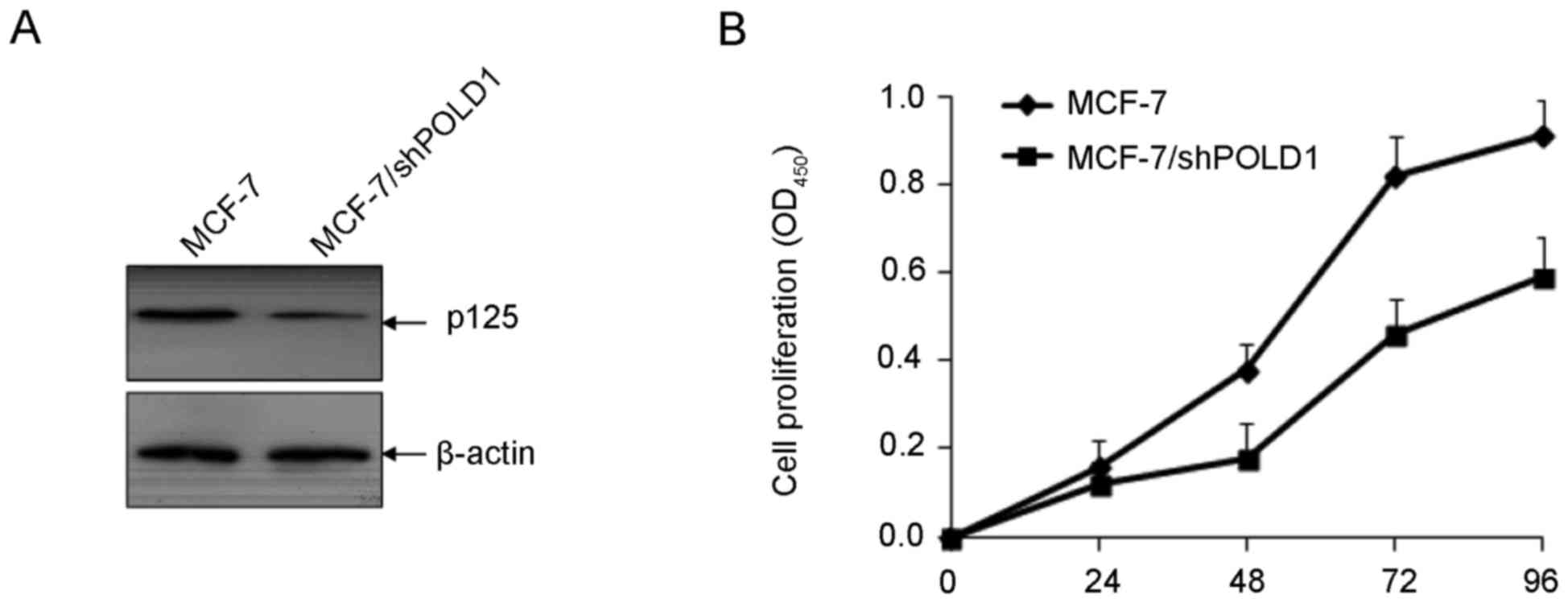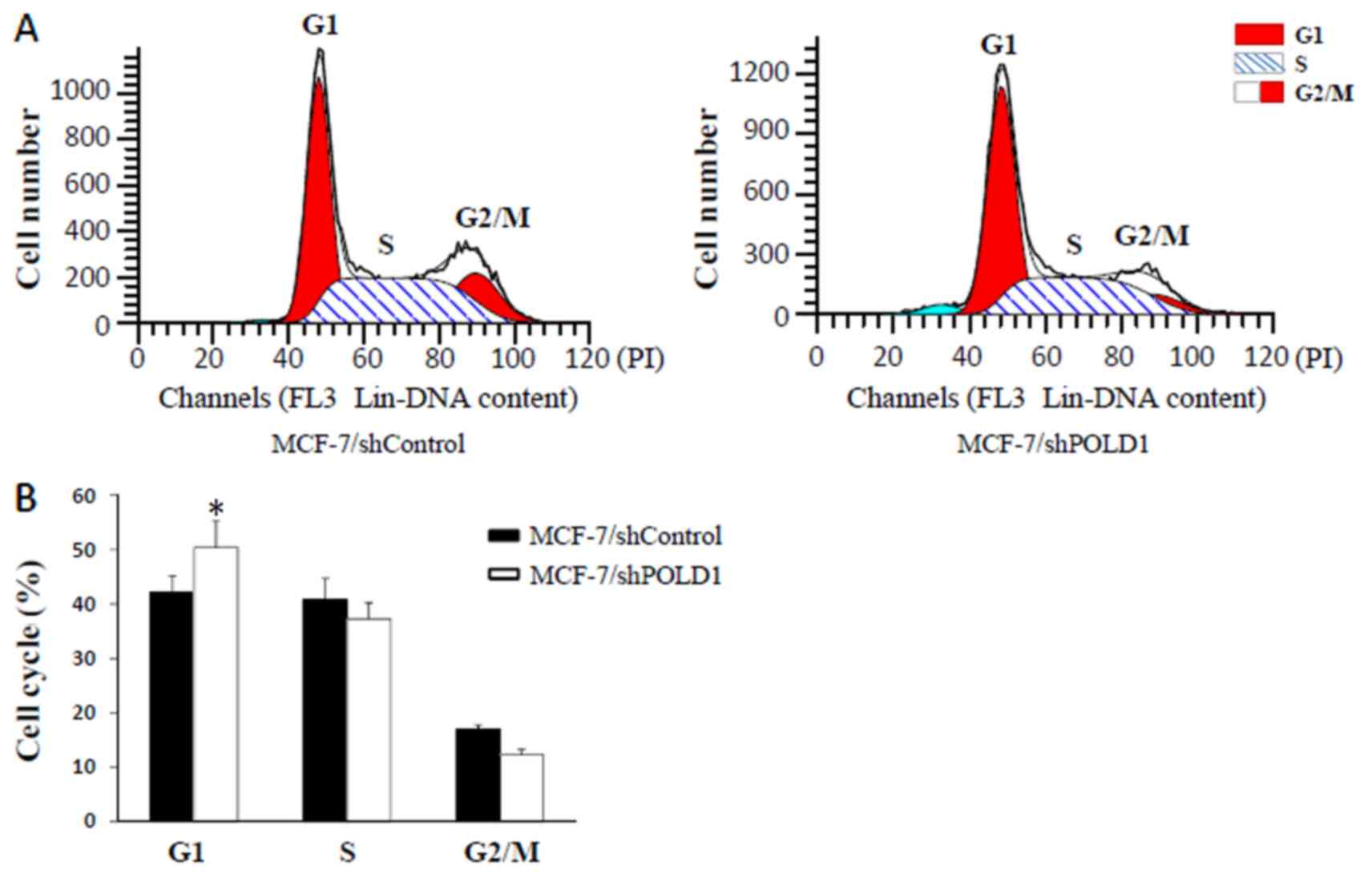|
1
|
Torre LA, Bray F, Siegel RL, Ferlay J,
Lortet-Tieulent J and Jemal A: Global cancer statistics, 2012. CA
Cancer J Clin. 65:87–108. 2015. View Article : Google Scholar : PubMed/NCBI
|
|
2
|
Liu L, Mo J, Rodriguez-Belmonte EM and Lee
MY: Identification of a fourth subunit of mammalian DNA polymerase
delta. J Biol Chem. 275:18739–18744. 2000. View Article : Google Scholar : PubMed/NCBI
|
|
3
|
Nicolas E, Golemis EA and Arora S: POLD1:
Central mediator of DNA replication and repair, and implication in
cancer and other pathologies. Gene. 590:128–141. 2016. View Article : Google Scholar : PubMed/NCBI
|
|
4
|
Sanefuji K, Taketomi A, Iguchi T,
Sugimachi K, Ikegami T, Yamashita Y, Gion T, Soejima Y, Shirabe K
and Maehara Y: Significance of DNA polymerase delta catalytic
subunit p125 induced by mutant p53 in the invasive potential of
human hepatocellular carcinoma. Oncology. 79:229–237. 2010.
View Article : Google Scholar : PubMed/NCBI
|
|
5
|
Venkatesan RN, Treuting PM, Fuller ED,
Goldsby RE, Norwood TH, Gooley TA, Ladiges WC, Preston BD and Loeb
LA: Mutation at the polymerase active site of mouse DNA polymerase
delta increases genomic instability and accelerates tumorigenesis.
Mol Cell Biol. 27:7669–7682. 2007. View Article : Google Scholar : PubMed/NCBI
|
|
6
|
Sigurdson AJ, Hauptmann M, Chatterjee N,
Alexander BH, Doody MM, Rutter JL and Struewing JP: Kin-cohort
estimates for familial breast cancer risk in relation to variants
in DNA base excision repair, BRCA1 interacting and growth factor
genes. BMC Cancer. 4:92004. View Article : Google Scholar : PubMed/NCBI
|
|
7
|
Goldhirsch A, Wood WC, Coates AS, Gelber
RD, Thurlimann B and Senn HJ: Panel members: Strategies for
subtypes-dealing with the diversity of breast cancer: Highlights of
the St. Gallen international expert consensus on the primary
therapy of early breast Cancer 2011. Ann Oncol. 22:1736–1747. 2011.
View Article : Google Scholar : PubMed/NCBI
|
|
8
|
Livak KJ and Schmittgen TD: Analysis of
relative gene expression data using real-time quantitative PCR and
the 2(-Delta Delta C(T)) method. Methods. 25:402–408. 2001.
View Article : Google Scholar : PubMed/NCBI
|
|
9
|
Zhang L, Yang W, Zhu X and Wei C: p53
inhibits the expression of p125 and the methylation of POLD1 gene
promoter by downregulating the Sp1-induced DNMT1 activities in
breast cancer. Onco Targets Ther. 9:1351–1360. 2016.PubMed/NCBI
|
|
10
|
Lessel D, Hisama FM, Szakszon K, Saha B,
Sanjuanelo AB, Salbert BA, Steele PD, Baldwin J, Brown WT, Piussan
C, et al: POLD1 Germline mutations in patients initially diagnosed
with Werner syndrome. Hum Mutat. 36:1070–1079. 2015. View Article : Google Scholar : PubMed/NCBI
|
|
11
|
Kashkin K, Chernov I, Stukacheva E,
Monastyrskaya G, Uspenskaya N, Kopantzev E and Sverdlov E: Cancer
specificity of promoters of the genes controlling cell
proliferation. J Cell Biochem. 116:299–309. 2015. View Article : Google Scholar : PubMed/NCBI
|
|
12
|
Siegel RL, Miller KD and Jemal A: Cancer
statistics, 2015. CA Cancer J Clin. 65:5–29. 2015. View Article : Google Scholar : PubMed/NCBI
|
|
13
|
Ceder R, Haig Y, Merne M, Hansson A, Zheng
X, Roberg K, Nees M, Iljin K, Bloor BK, Morgan PR, et al:
Differentiation-promoting culture of competent and noncompetent
keratinocytes identifies biomarkers for head and neck cancer. Am J
Pathol. 180:457–472. 2012. View Article : Google Scholar : PubMed/NCBI
|
|
14
|
Narayan G, Bourdon V, Chaganti S,
Arias-Pulido H, Nandula SV, Rao PH, Gissmann L, Dürst M, Schneider
A, Pothuri B, et al: Gene dosage alterations revealed by cDNA
microarray analysis in cervical cancer: Identification of candidate
amplified and overexpressed genes. Genes Chromosomes Cancer.
46:373–384. 2007. View Article : Google Scholar : PubMed/NCBI
|
|
15
|
Goldsby RE, Hays LE, Chen X, Olmsted EA,
Slayton WB, Spangrude GJ and Preston BD: High incidence of
epithelial cancers in mice deficient for DNA polymerase delta
proofreading. Proc Natl Acad Sci USA. 99:15560–15565. 2002.
View Article : Google Scholar : PubMed/NCBI
|
|
16
|
Wong A, Kuick CH, Wong WL, Tham JM, Mansor
S, Loh E, Jain S, Vikas NN, Tan SH, Chan SH, et al: Mutation
spectrum of POLE and POLD1 mutations in South East Asian women
presenting with grade 3 endometrioid endometrial carcinomas.
Gynecol Oncol. 141:113–120. 2016. View Article : Google Scholar : PubMed/NCBI
|
|
17
|
Palles C, Cazier JB, Howarth KM, Domingo
E, Jones AM, Broderick P, Kemp Z, Spain SL, Guarino E, Salguero I,
et al: Germline mutations affecting the proofreading domains of
POLE and POLD1 predispose to colorectal adenomas and carcinomas.
Nat Genet. 45:136–144. 2013. View
Article : Google Scholar : PubMed/NCBI
|
|
18
|
Cao B, Zhang Z, Zhang Y, Li J, Liang G and
Ling J: Effect of Smilax china L.-containing serum on the
expression of POLD1 mRNA in human hepatocarcinoma SMMC-7721 cells.
Exp Ther Med. 6:1070–1076. 2013. View Article : Google Scholar : PubMed/NCBI
|
|
19
|
Song J, Hong P, Liu C, Zhang Y, Wang J and
Wang P: Human POLD1 modulates cell cycle progression and DNA damage
repair. BMC Biochem. 16:142015. View Article : Google Scholar : PubMed/NCBI
|
|
20
|
Roe OD, Szulkin A, Anderssen E, Flatberg
A, Sandeck H, Amundsen T, Erlandsen SE, Dobra K and Sundstrøm SH:
Molecular resistance fingerprint of pemetrexed and platinum in a
long-term survivor of mesothelioma. PLoS One. 7:e405212012.
View Article : Google Scholar : PubMed/NCBI
|
|
21
|
Li B and Lee MY: Transcriptional
regulation of the human DNA polymerase delta catalytic subunit gene
POLD1 by p53 tumor suppressor and Sp1. J Biol Chem.
276:29729–29739. 2001. View Article : Google Scholar : PubMed/NCBI
|
|
22
|
Lee A and Djamgoz MBA: Triple negative
breast cancer: Emerging therapeutic modalities and novel
combination therapies. Cancer Treat Rev. 62:110–122. 2018.
View Article : Google Scholar : PubMed/NCBI
|
|
23
|
Chang HR: Trastuzumab-based neoadjuvant
therapy in patients with HER2-positive breast cancer. Cancer.
116:2856–2867. 2010. View Article : Google Scholar : PubMed/NCBI
|



















